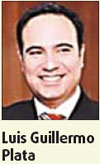The common thread of leadership
Updated: 2007-09-06 06:35
The worldwide trend toward globalization demands men and women with a visionary attitude capable of recognizing, in what might appear to be an obstacle, a growth opportunity for society and potentially even for themselves.
Indeed, this serves as a strong basis for the definition of leadership - a leader as an individual whose vision goes beyond the apparent, and who is likewise capable of communicating and planting, in a human group, the seed of what is to be attained, the seed of the possible.
From this perspective, leaders play an important role in society because it is through their vision and aspirations that new realities are conceptualized and built.

Leaders must, above all, be visionaries. They must be very clear on what they wish to attain for themselves and for others. They must be capable of communicating their aspirations and goals, as well as influencing those around them in order to propel the necessary processes to attain change, whether social, economic or political.
Good business leaders prepare themselves through study, discipline, the ability to convey ideas, the power to influence subordinates to walk the same path and, above all, by setting an example. In addition, strength of character and the courage to take risks are of paramount importance.
Looking into history, we do not find many differences between the leaders of the past and the present. All of them, without exception, have the characteristics delineated above. Yet, present leaders have access to the technological and knowledge developments that marked the 20th century, and which in the dawn of this new century threaten to overflow our imaginations.
In the Americas, for example, Simn Bolvar led the emancipation of the Spanish colonies in the 19th century by imposing his vision and commitment to his cause. By all accounts, he did this largely through a remarkable stubbornness.
In more recent times in Colombia, my country, we have had very significant economic and political leaders, such as our current President Alvaro Uribe Vlez, whose main vision is to build a country that is free of violence so that it can grow economically and socially, seeking greater well-being for all.
All of the above leads me to the conclusion that future leaders will not be much different from current leaders. Like current leaders, they will need the same characteristics that mark a difference between an ordinary person and a leader. They will probably have access to greater technological developments, but will also have within them the essence of leadership and a great desire to serve society.
From here, the importance and necessity of organizations, such as the Forum of Young Global Leaders, which are dedicated to promoting and improving leadership in the world as an engine to drive the well-being of the planet, become clear.
By supporting young men and women who possess a broad vision of the world, considerable cultural knowledge, who are equipped with leadership skills and commit to taking on an active role with a view to solving the problems of their respective regions, institutions like the Forum of Young Global Leaders have a critical role in shaping the future.
This topic, the Future of Leadership, and other issues will be discussed at the Young Global Leaders Annual Summit 2007 in Dalian.
The author is a Young Global Leader of the World Economic Forum and Minister of Trade, Industry and Tourism of Colombia
(China Daily 09/05/2007 page7)
|
|
|
||
|
||
|
|
|
|